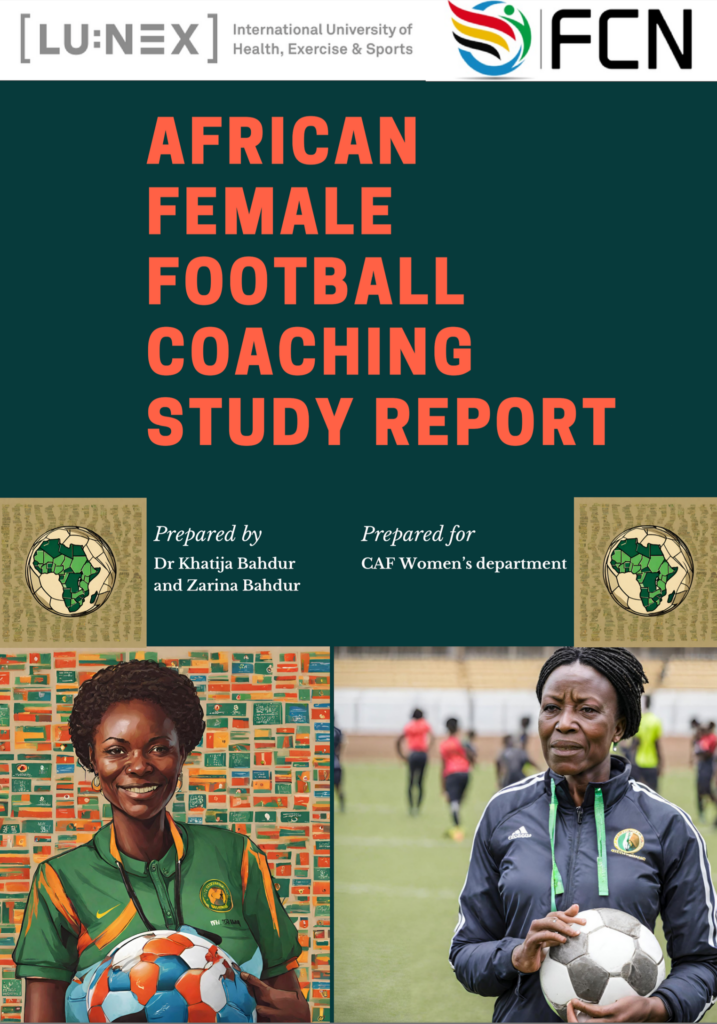
The Female Coaching Network (FCN) is proud to announce the launch of a pivotal study report on the status, challenges, and potential of female coaches in African football. This report, developed in collaboration with the Confederation of African Football (CAF) and LUNEX University delves into the current state of female football coaching in Africa, bringing attention to critical barriers while outlining actionable strategies to promote gender inclusivity in the sport’s coaching sector.
In an industry where women remain significantly underrepresented, this study provides an essential examination of the persistent gender disparities affecting female coaches. The report highlights issues including limited access to resources, deeply ingrained cultural biases, and restricted pathways for career advancement. Drawing from comprehensive data and the personal experiences of African female coaches, the findings underscore both the unique strengths and systemic challenges faced by women pursuing coaching careers across the continent.
Key Findings of the Report
The report identifies several significant insights, setting the stage for future advocacy and reforms within the African football community. Among the primary findings:
- Systemic Barriers and Cultural Challenges: Female coaches encounter numerous societal and structural barriers, often facing skepticism and marginalisation in a traditionally male-dominated industry. Many report feeling isolated within their communities and struggling with limited support from local institutions. These challenges are amplified by pervasive cultural norms that often discourage women from pursuing leadership roles in sports.
- Limited Access to Coaching Resources and Training: Another critical barrier is the lack of access to essential resources, including advanced training, mentorship, and funding. Despite their dedication and talent, many female coaches face significant difficulties in obtaining certification and further development, limiting their potential to progress professionally and represent African talent on a global scale.
- Inspiring Case Studies of Resilience: Despite the challenges, the report brings to light several inspiring case studies of women who have made significant strides in African football coaching. These stories showcase the resilience and determination of female coaches, who, with limited resources, continue to influence and uplift the next generation of players. Their successes serve as a testament to the positive impact women can make when afforded opportunities for growth.
A Vision for the Future: Recommendations and Strategies
The report also offers a comprehensive set of recommendations aimed at dismantling existing barriers and creating a more inclusive environment for female coaches in Africa. Key strategies include:
- Establishing Support Networks and Mentorship Programs: By creating structured support systems and mentorship opportunities, female coaches can gain the guidance and encouragement necessary for career advancement. Mentorship programs connecting experienced professionals with aspiring female coaches are particularly emphasised as a critical element for long-term success.
- Increasing Access to Training and Development Resources: The report advocates for expanded access to formal coaching programs and professional certifications. Investing in these resources will empower female coaches to pursue and sustain their coaching careers, equipping them with the skills needed to excel in competitive environments.
- Advocacy and Policy Development for Gender Equity: Finally, the report calls upon governing bodies, including CAF and national football associations, to prioritize gender equity policies and initiatives. By promoting inclusive hiring practices and equal access to coaching roles, these organisations can play a crucial role in transforming the landscape of African football.
Join Us in Supporting Female Coaches Across Africa
We encourage stakeholders, fans, and institutions to engage with the findings of this report and support initiatives that foster diversity in football coaching. The study not only highlights the tremendous potential of female coaches in Africa but also offers a roadmap for breaking down barriers, creating a future where women in football can thrive and contribute fully to the game’s development.
For the full report, please see below
Find out more about the FCN and LUNEX University collaboration HERE